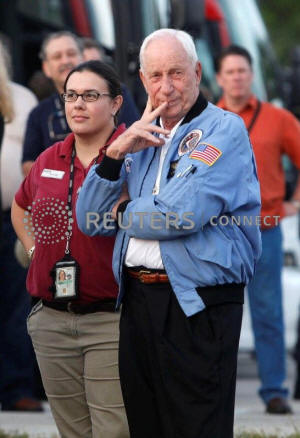|
Apollo astronauts celebrate 50 years
since first moon landing
 Send a link to a friend
Send a link to a friend
 [June 19, 2019]
By Forrest Crellin [June 19, 2019]
By Forrest Crellin
PARIS (Reuters) - Three astronauts
instrumental in the groundbreaking U.S. space program of the 1960s and
70s gathered at the Paris Air Show on Tuesday to celebrate the 50th
anniversary of Apollo 11, the mission that first put a man on the moon.
Walter Cunningham, 87, who was part of the Apollo 7 mission, Al Worden,
87, who flew with Apollo 15, and Charlie Duke, 83, who walked on the
moon with Apollo 16, recounted their extra-terrestrial experiences
before a captive airshow audience.
Worden, who orbited the moon alone for days in 1971, holds the feat of
having been the world's most isolated human, while Cunningham is notable
for being part of a team that talked back to Mission Control in 1968,
getting them blacklisted from future flights.
Despite that setback, which came after the astronauts asked Mission
Control if they could reenter the atmosphere without helmets on and were
told no, Cunningham remembers his experiences fondly.
"Five hundred years from now there is only going to be one thing they
remember about Apollo, and that is that man landed on the moon," he told
the audience.

"That'll be it. And people will have no idea how hard it was, for
example, to get the first Apollo mission off. Apollo 7 was the fifth
mission that Wally Schirra, Donn Eisele and I were on, and finally we
flew."
NASA pioneered space flight in the 1960s, amid competition from Soviet
cosmonauts, but not without serious risks.
The Apollo 1 mission burned up on the launch pad during a test in 1967,
killing the crew and prompting NASA to halt all attempts at manned
flights. Only two years later, once the Command Module and spacesuits
had been redesigned, was Apollo 7 cleared for launch.
Charlie Duke was a part of the Apollo 16 mission in 1972, and became the
youngest person to walk on the moon at 36.
[to top of second column]
|

Former Apollo astronaut Al Worden (R) arrives at the VIP viewing
site for launch of the Ares I-X test rocket at the Kennedy Space
Center in Cape Canaveral, Florida October 27, 2009. REUTERS/Scott
Audette

“It's like 'well I'm home, I know where to go, I know what's over
here'," he said of the experience, which only 12 people have ever
had.
"It was a feeling of belonging, but it was also wonder, awe,
excitement, adventure.
"The best way I could describe it, if you could imagine a
five-year-old kid on Christmas and birthday and everything else
rolled into one. That was the most exciting moment in my life."
Apollo 11, the mission that ultimately delivered Neil Armstrong and
Buzz Aldrin to the moon, touched down on July 20th, 1969. NASA has
organized a series of events to commemorate the 50th anniversary.
(Additional reporting by Emily Delwarde; Editing by Luke Baker and
Andrew Cawthorne)
[© 2019 Thomson Reuters. All rights
reserved.]
Copyright 2019 Reuters. All rights reserved. This material may not be published,
broadcast, rewritten or redistributed.
Thompson Reuters is solely responsible for this content.
 |